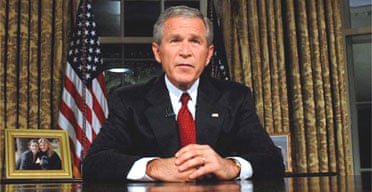George Bush last night admitted that Saddam Hussein had no hand in the 9/11 terror attacks, but he asked Americans to support a war in Iraq that he said was the defining struggle of our age.
On a day of sorrow and remembrance, beginning with a moment of silence at Ground Zero and ending in a prime time TV address from the Oval Office, Mr Bush tried to steel Americans for the long war ahead against al-Qaida which he described as an epochal struggle.
His speech was also focused on November's congressional elections where the Republicans face a groundswell of discontent about the war in Iraq.
The president conceded some crucial ideological ground, formally disavowing the neo-conservative accusation that Saddam had played a role in the attacks on September 11 2001. But he was unapologetic about the decision to invade Iraq.
"I am often asked why we are in Iraq when Saddam Hussein was not responsible for the 9/11 attacks," Mr Bush said. "The answer is that the regime of Saddam Hussein was a clear threat. My administration, the Congress, and the United Nations saw the threat - and after 9/11, Saddam's regime posed a risk that the world could not afford to take.
"The world is safer because Saddam Hussein is no longer in power."
The admission that Saddam had no connection to the attacks on the World Trade Centre and the Pentagon was a departure for a president who is famously averse to any expression of regret. But Mr Bush, angling to regain the trust of US voters in his leadership of the war on terror, made another display of humility, admitting to other unspecified mistakes in the war on Iraq.
However, the president brushed aside any idea of an early exit from Iraq, saying a withdrawal of US forces would hand a victory to al-Qaida.
"Whatever mistakes have been made in Iraq, the worst mistake would be to think that if we pulled out, the terrorists would leave us alone. They will not leave us alone. They will follow us," Mr Bush said.
"If we yield Iraq to men like bin Laden, our enemies will be emboldened ... they will gain a new safe haven ... and they will use Iraq's resources to fuel their extremist movement."
Last night's address crowned a series of speeches intended to retune the political agenda to the Republicans' traditionally strong suit: national security. Although the 2,600 US forces killed in Iraq now approaches the toll on September 11 and polls this month showed some 60% of Americans opposed to the administration's handling of the war in Iraq, Mr Bush continues to inspire confidence for his leadership on terrorism and in matters of national security.
With that in mind, Mr Bush moved last night to cast himself as a wartime leader in the mould of the two US presidents who presided over the epic battles of the last century. Both were Democrats: Franklin Roosevelt against Germany and Japan in the second world war, and Harry Truman in the cold war.
Mr Bush said he was leading a struggle that in these early days may seem just as daunting as the beginning of the second world war. But he said that the war on terror was as much an existential struggle, and that America could not afford to lose heart now, despite the high cost in Iraq.
"The war against this enemy is more than a military conflict. It is the decisive ideological struggle of the 21st century, and the calling of our generation," he said. "If we do not defeat these enemies now, we will leave our children to face a Middle East overrun by terrorist states and radical dictators armed with nuclear weapons."
